八年级下册英语第五单元知识点整理
英语八年级下册第五单元笔记
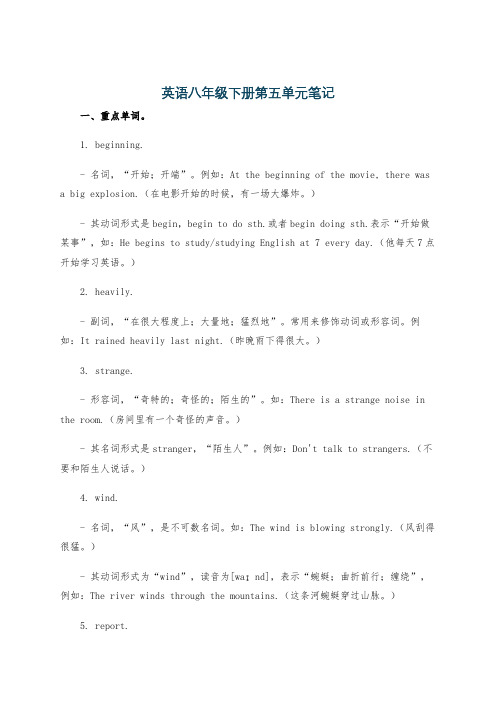
英语八年级下册第五单元笔记一、重点单词。
1. beginning.- 名词,“开始;开端”。
例如:At the beginning of the movie, there was a big explosion.(在电影开始的时候,有一场大爆炸。
)- 其动词形式是begin,begin to do sth.或者begin doing sth.表示“开始做某事”,如:He begins to study/studying English at 7 every day.(他每天7点开始学习英语。
)2. heavily.- 副词,“在很大程度上;大量地;猛烈地”。
常用来修饰动词或形容词。
例如:It rained heavily last night.(昨晚雨下得很大。
)3. strange.- 形容词,“奇特的;奇怪的;陌生的”。
如:There is a strange noise in the room.(房间里有一个奇怪的声音。
)- 其名词形式是stranger,“陌生人”。
例如:Don't talk to strangers.(不要和陌生人说话。
)4. wind.- 名词,“风”,是不可数名词。
如:The wind is blowing strongly.(风刮得很猛。
)- 其动词形式为“wind”,读音为[waɪnd],表示“蜿蜒;曲折前行;缠绕”,例如:The river winds through the mountains.(这条河蜿蜒穿过山脉。
)5. report.- 名词,“报告;报道”。
例如:I read a report about the accident in the newspaper.(我在报纸上读到了一篇关于这个事故的报道。
)- 动词,“报道;公布”。
如:The journalist reported the news on TV.(这位记者在电视上报道了这条新闻。
人教版八年级下册英语Unit 5 知识点语法归纳总结
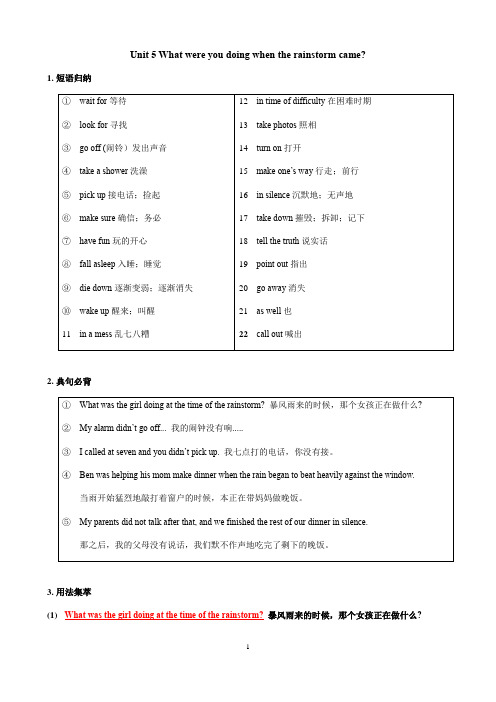
Unit 5 What were you doing when the rainstorm came?1.短语归纳2.典句必背3.用法集萃(1)What was the girl doing at the time of the rainstorm?暴风雨来的时候,那个女孩正在做什么?❖本句是特殊疑问句,时态是过去进行时,结构是“What+was/were+主语+doing+其他?”,用于询问某人在过去的某个时间正在做的事情。
例:—What were you doing at nine o’clock yesterday evening? 昨天晚上九点你正在做什么?—I was watching TV at home. 我正在家里看电视。
❖拓展:过去进行时描述过去某个时刻正在发生的动作或存在的状态,结构是“was/ were+动词的现在分词”。
例:When I got home my mother was cooking. 我到家的时候我妈妈正在做饭(2)My alarm didn’t go off... 我的闹钟没有响.....❖go off意为“(闹钟)发出响声”例:My alarm goes off at six every morning. 我的闹钟每天早晨6点响。
❖归纳:go off还有“离开”和“变质”之意。
例:Bob went off to get a drink. 鲍勃拿饮料去了。
Meat goes off quickly in hot weather. 热天肉变质得快。
❖拓展:go的短语(3)I called at seven and you didn’t pick up. 我七点打的电话,你没有接。
❖pick up意为“接电话”。
pick up有如下含义:(4)I called again at eight and you didn’t answer then either. 我八点再打来,你也没接。
人教版八年级英语下册第五单元知识点汇总总结
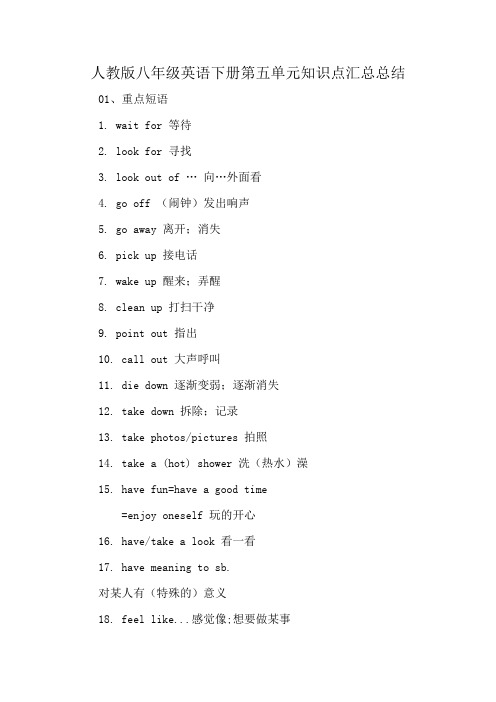
人教版八年级英语下册第五单元知识点汇总总结01、重点短语1. wait for 等待2. look for 寻找3. look out of … 向…外面看4. go off (闹钟)发出响声5. go away 离开;消失6. pick up 接电话7. wake up 醒来;弄醒8. clean up 打扫干净9. point out 指出10. call out 大声呼叫11. die down 逐渐变弱;逐渐消失12. take down 拆除;记录13. take photos/pictures 拍照14. take a (hot) shower 洗(热水)澡15. have fun=have a good time=enjoy oneself 玩的开心16. have/take a look 看一看17. have meaning to sb.对某人有(特殊的)意义18. feel like...感觉像;想要做某事19. make sure 务必,确保20. beat against 敲打21. fall asleep 进入梦乡22. break … apart 使…支离破碎23. turn on打开 (反:turn off关上)24. listen to the radio 听收音机25. get to = arrive in/at 到达26. make one’s way to 前往;费力前行27. to tell the truth 说实话28. walk by 路过29. at the time of …在…的时候30. in a mess 凌乱不堪;乱七八糟31. in times of difficulty 在困难时期32. because of 因为33. in history 在历史上34. in silence 沉默,无声35. at first 起初;起先36. by the side of …在…旁边37. the rest of …剩余的38. each other 互相39. for example 例如40. as well 也02、重点句子Grammar Focus 句子1. What were you doing at eight last night?昨天晚上8点你在做什么?I was taking a shower.我在洗淋浴。
八年级英语下册第五单元的知识点
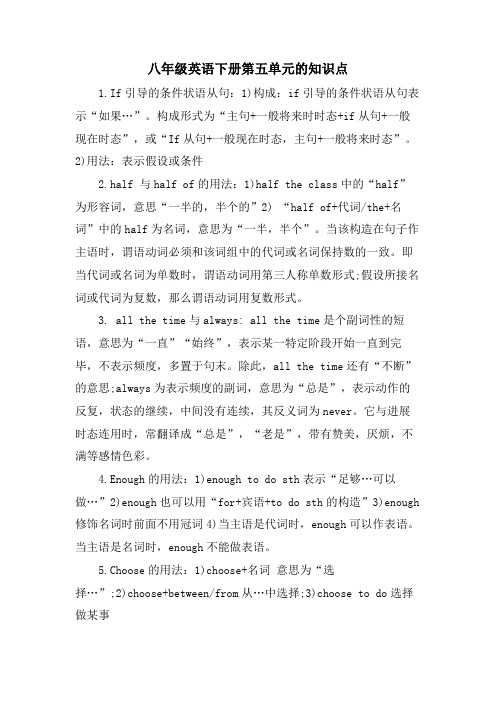
八年级英语下册第五单元的知识点1.If引导的条件状语从句:1)构成:if引导的条件状语从句表示“如果…”。
构成形式为“主句+一般将来时时态+if从句+一般现在时态”,或“If从句+一般现在时态,主句+一般将来时态”。
2)用法:表示假设或条件2.half 与half of的用法:1)half the class中的“half”为形容词,意思“一半的,半个的”2) “half of+代词/the+名词”中的half为名词,意思为“一半,半个”。
当该构造在句子作主语时,谓语动词必须和该词组中的代词或名词保持数的一致。
即当代词或名词为单数时,谓语动词用第三人称单数形式;假设所接名词或代词为复数,那么谓语动词用复数形式。
3. all the time与always: all the time是个副词性的短语,意思为“一直”“始终”,表示某一特定阶段开始一直到完毕,不表示频度,多置于句末。
除此,all the time还有“不断”的意思;always为表示频度的副词,意思为“总是”,表示动作的反复,状态的继续,中间没有连续,其反义词为never。
它与进展时态连用时,常翻译成“总是”,“老是”,带有赞美,厌烦,不满等感情色彩。
4.Enough的用法:1)enough to do sth表示“足够…可以做…”2)enough也可以用“for+宾语+to do sth的构造”3)enough 修饰名词时前面不用冠词4)当主语是代词时,enough可以作表语。
当主语是名词时,enough不能做表语。
5.Choose的用法:1)choose+名词意思为“选择…”;2)choose+between/from从…中选择;3)choose to do选择做某事6.Exercise的用法:1)运动,锻炼,是不可数名词2)体操,练习,是可数名词。
3)动词,使….运动7.wear, put on, have on, dress: wear“穿着”“戴着”,表示状态,是延续性动词,一般现在时表示经常状态,现在进展时表示暂时状态;put on“穿上”“戴上”,表示动作,是非延续性动词;have on“穿着”“戴着”,表示状态可以与wear互换;dress“穿上”“穿着”,既表示状态,也表示动作,既可以作及物动词,也可以作不及物动词。
八年级英语下册第五单元知识点整理
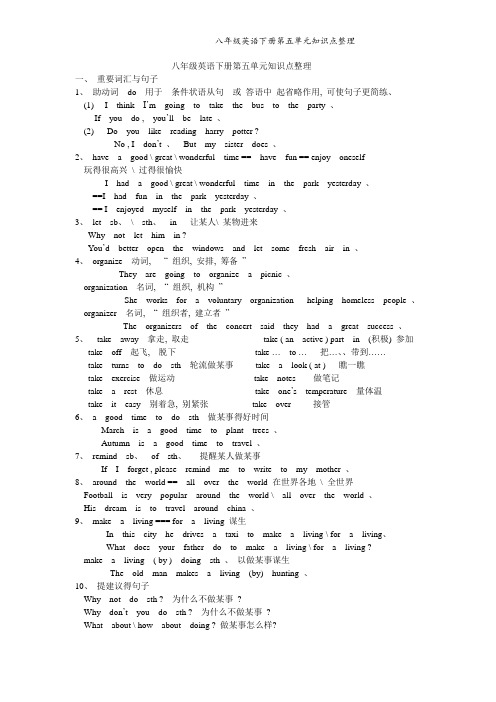
八年级英语下册第五单元知识点整理一、重要词汇与句子1、助动词do 用于条件状语从句或答语中起省略作用, 可使句子更简练、(1)--- I think I’m going to take the bus to the party 、--- If you do , you’ll be late 、(2) --- Do you like reading harry potter ?--- No , I don’t 、But my sister does 、2、have a good \ great \ wonderful time == have fun == enjoy oneself玩得很高兴\ 过得很愉快I had a good \ great \ wonderful time in the park yesterday 、==I had fun in the park yesterday 、== I enjoyed myself in the park yesterday 、3、let sb、\ sth、in 让某人\ 某物进来Why not let him in ?You’d better open the windows and let some fresh air in 、4、organize 动词, “组织, 安排, 筹备”They are going to organize a picnic 、organization 名词, “组织, 机构”She works for a voluntary organization helping homeless people 、organizer 名词, “组织者, 建立者”The organizers of the concert said they had a great success 、5、take away 拿走, 取走take ( an active ) part in (积极) 参加take off 起飞, 脱下take …to …把…、、带到……take turns to do sth 轮流做某事take a look ( at ) 瞧一瞧take exercise 做运动take notes 做笔记take a rest 休息take one’s temperature 量体温take it easy 别着急, 别紧张take over 接管6、a good time to do sth 做某事得好时间March is a good time to plant trees 、Autumn is a good time to travel 、7、remind sb、of sth、提醒某人做某事If I forget , please remind me to write to my mother 、8、around the world == all over the world 在世界各地\ 全世界Football is very popular around the world \ all over the world 、His dream is to travel around china 、9、make a living === for a living 谋生In this city he drives a taxi to make a living \ for a living、What does your father do to make a living \ for a living ?make a living ( by ) doing sth 、以做某事谋生The old man makes a living (by) hunting 、10、提建议得句子Why not do sth ? 为什么不做某事?Why don’t you do sth ? 为什么不做某事?What about \ how about doing ? 做某事怎么样?Would you like to do sth ? 您想\ 愿意做某事吗?Shall we do sth ? 我们去做某事, 好吗?Let’s do sth , shall we ? 让我们做某事, 好吗?Do you want to do sth ? 您想去做某事吗?11、seem like sth 瞧起来像……It seems like years since I last saw you 、自从我上次见到您以后, 好象就是过了好几年、Those cards seemed like many little flags 、那些卡片瞧起来好象许多小旗子。
八年级下册英语第五单元知识点
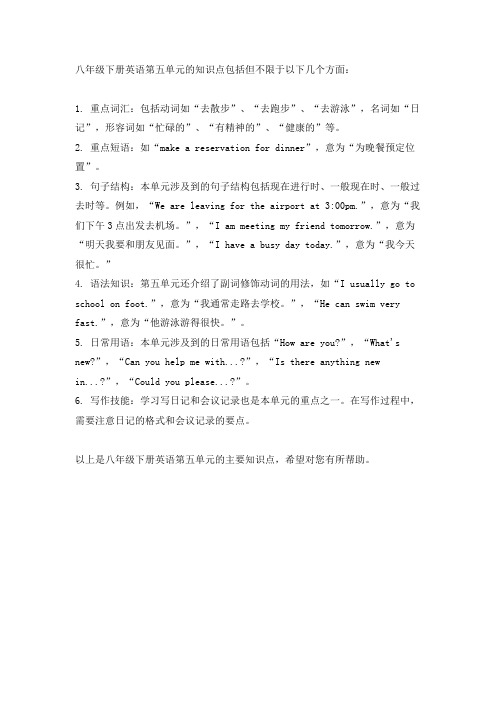
八年级下册英语第五单元的知识点包括但不限于以下几个方面:
1. 重点词汇:包括动词如“去散步”、“去跑步”、“去游泳”,名词如“日记”,形容词如“忙碌的”、“有精神的”、“健康的”等。
2. 重点短语:如“make a reservation for dinner”,意为“为晚餐预定位置”。
3. 句子结构:本单元涉及到的句子结构包括现在进行时、一般现在时、一般过去时等。
例如,“We are leaving for the airport at 3:00pm.”,意为“我们下午3点出发去机场。
”,“I am meeting my friend tomorrow.”,意为“明天我要和朋友见面。
”,“I have a busy day today.”,意为“我今天很忙。
”
4. 语法知识:第五单元还介绍了副词修饰动词的用法,如“I usually go to school on foot.”,意为“我通常走路去学校。
”,“He can swim very fast.”,意为“他游泳游得很快。
”。
5. 日常用语:本单元涉及到的日常用语包括“How are you?”,“What's new?”,“Can you help me with...?”,“Is there anything new in...?”,“Could you please...?”。
6. 写作技能:学习写日记和会议记录也是本单元的重点之一。
在写作过程中,需要注意日记的格式和会议记录的要点。
以上是八年级下册英语第五单元的主要知识点,希望对您有所帮助。
初中英语人教新目标八年级下册Unit 5知识点(重点单词+词形变换+重点短语+重点句型)

八年级英语下册Unit5知识点【Section A】【重点单词】1.alarm n.闹钟2.wind n.风3.storm n.暴风雨4.area n.地域;地区5.suddenly adv.突然6.window n.窗户7.realize v.领会;认识到8.strange adj.奇特的;奇怪的9.heavily adv.在很大程度上;大量地【词形变换】1.begin v.开始→beginning(现在分词)began(过去式)2.heavily adv.在很大程度上;大量地→ heavy(adj.)3.report v.&n.报道;公布→ reporter(n.记者)4.match n.火柴→matches(复数)5.beat v.敲打;打败→beat(过去式)6.asleep adj.睡着的→sleepy(adj.困乏的;欲睡的)sleep(v.睡;睡觉)7.rise v.&n.升起;增加;提高→rose(过去式)8.fall v.倒塌;跌倒;掉落→fell(过去式)fallen(adj.倒下的;落下的)9.icy adj.覆盖着冰的;冰冷的→ice(n.冰)10.kid v.开玩笑;欺骗→kidding(现在分词)【重点短语】1.在暴风雨来的时候at the time of the rainstorm2.在公交站点at the bus stop3.等公交车wait for the bus4.(闹钟)发出响声go off5.洗热水澡take a hot shower6.接电话pick up (=pick up the phone)7.使……靠拢bring ...close together8.室外没有光with no light outside9.在附近街区in the neighborhood10.确保;查明make sure11.逐渐变弱;逐渐消失die down12.醒来;唤醒;叫醒wake up13.一团糟in a mess14.使……分离break...apart15.在困难的时候in times of difficulty【重点句型】1.当暴风雨来临时他正在图书馆里看书。
人教版英语八年级下册第五单元语法重点
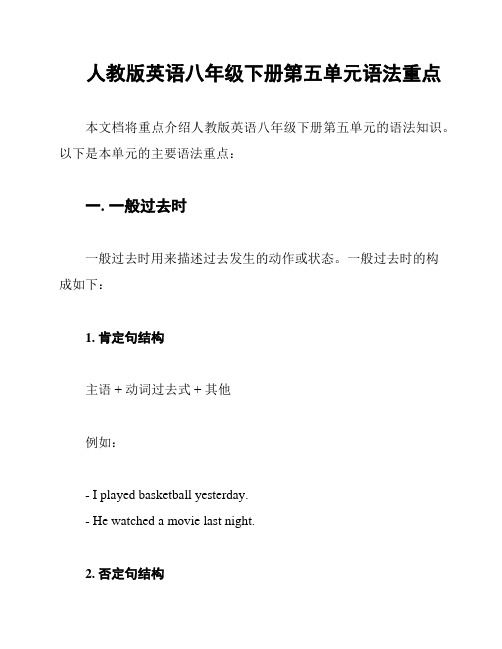
人教版英语八年级下册第五单元语法重点本文档将重点介绍人教版英语八年级下册第五单元的语法知识。
以下是本单元的主要语法重点:一. 一般过去时一般过去时用来描述过去发生的动作或状态。
一般过去时的构成如下:1. 肯定句结构主语 + 动词过去式 + 其他例如:- I played basketball yesterday.- He watched a movie last night.2. 否定句结构主语 + did not + 动词原形 + 其他例如:- I did not play basketball yesterday. - He did not watch a movie last night.3. 疑问句结构Did + 主语 + 动词原形 + 其他?例如:- Did you play basketball yesterday? - Did he watch a movie last night?二. 现在进行时现在进行时用来描述目前正在发生的动作。
现在进行时的构成如下:1. 肯定句结构主语 + am/is/are + 动词-ing + 其他例如:- She is reading a book now.- We are playing soccer at the moment.2. 否定句结构主语 + am not/is not/are not + 动词-ing + 其他例如:- She is not reading a book now.- We are not playing soccer at the moment.3. 疑问句结构Am/is/are + 主语 + 动词-ing + 其他?例如:- Is she reading a book now?- Are we playing soccer at the moment?三. 过去进行时过去进行时用来描述过去某一时刻正在进行的动作。
过去进行时的构成如下:1. 肯定句结构主语 + was/were + 动词-ing + 其他例如:- They were studying English at 8 p.m. yesterday.- He was playing video games when I called him.2. 否定句结构主语 + was not/were not + 动词-ing + 其他例如:- They were not studying English at 8 p.m. yesterday. - He was not playing video games when I called him.3. 疑问句结构Was/were + 主语 + 动词-ing + 其他?例如:- Were they studying English at 8 p.m. yesterday?- Was he playing video games when I called him?以上是人教版英语八年级下册第五单元的语法重点。
- 1、下载文档前请自行甄别文档内容的完整性,平台不提供额外的编辑、内容补充、找答案等附加服务。
- 2、"仅部分预览"的文档,不可在线预览部分如存在完整性等问题,可反馈申请退款(可完整预览的文档不适用该条件!)。
- 3、如文档侵犯您的权益,请联系客服反馈,我们会尽快为您处理(人工客服工作时间:9:00-18:30)。
八年级下册英语第五单元知识点整理
一,课文重难点讲解:
1、If you go to the party, you'll have a good time、
条件状语从句常由从属连词if,unless等引导。
与时间状语从句一样,条件状语从句用一般现在时而不用将来时,尤其注意主语为第三人称单数时,动词使用单数形式。
if引导得条件状语从句得结构:if+一般现在时,主语+将来时。
If you ask him, he will help you、
If it rains tomorrow, we won't go to the park、
I'll go with you if I'm free、
2、I think I'm going to wear jeans to the party、
If you do, the teacher won't let you in、
(1)do用作代动词,代替上文得动词部分“wear jeans to the party”,为避免重复。
(2)let in意为“让……进来”
Windows let in light and air、
You must keep the door closed、Don't let the dog in、
3、Today is too early、If we have it today, half the class won't come、
(1)too“太…”,带否定含义。
(2)class此处指全班同学。
half a/an, a half, half the 后接名词,表示“一半”、
He ran half a mile / a half mile in half an hour、
I have finished half the book、
注意表“半个…”或“…个半”时,half一词得用法。
half an hour 半小时,half a year 半年,one year and a half 一年半,one and a half years 一年半,five and half days 五天半
4、We can all meet and watch a video、
meet 碰头,聚集,见面,watch a video 瞧录像
5、Some students will be bored、
be bored, get bored 疲乏得,厌倦得
bored 指人得状态,主语为人“厌乏得”
I'll get bored if I read English for a long time、
The TV play is too boring、
I'm not interested in such boring stories、
6、When is a good time to have the party?
Let's have it today、
“to have the party”就是不定式作定语修饰名词time、不定式作定语通常要放在所修饰得名词或代词之后。
7、I want you to remember the rules for school parties、
(1)want sb、to do sth、想让某人做某事
(2)remember v、记住,记得,想起
remember to do sth、记得去做某事
remember doing sth、记得做过某事
(3)rules for school parties、学校聚会得规则
8、Don't bring food to the party、If you do, the teachers will take it away、
bring sth、to sb、= bring sb、sth、带给某人某物
take sth、away 把某物拿走
9、Will I travel much? 我会做很多旅行吗?
10、If you do, the teachers will ask them to leave、
(1)ask sb、to do sth、让某人做某事
ask sb、not to do sth、让某人不(别)做某事
(2)leave v、离开;留下、剩下
11、go to college 上大学
make money 挣钱
get an education 接受教育
12、For many young people, becoming a professional athlete might seem like a dream job、 seem like 似乎(就是)……
dream job 理想得工作
13、You'll be able to make a living doing something you love、
(1)be able to “能,会”,时态变化体现在be动词上。
(2)make a living 谋生,do sth、for a living 做某事以谋生
14、People will watch you all the time and follow you everywhere、
watch “注视,关注”
all the time 一直
follow “跟随”,及物动词,follow sb、跟随某人
everywhere “每处地方”,副词,前不能用介词。
15、get injoured 受伤
16、If you become rich, you will have a difficult time knowing who your real friends are、(1)become rich 变得富有。
become, turn, get等就是表变化过程得系动词,后跟形容词。
become true, turn red, get ill,
(2)have a difficult / hard time 度过艰难时期
17、Maybe I'll become a teacher、或许我将成为一名教师。
maybe“也许”“或许”副词,在句中位置可前可后。
